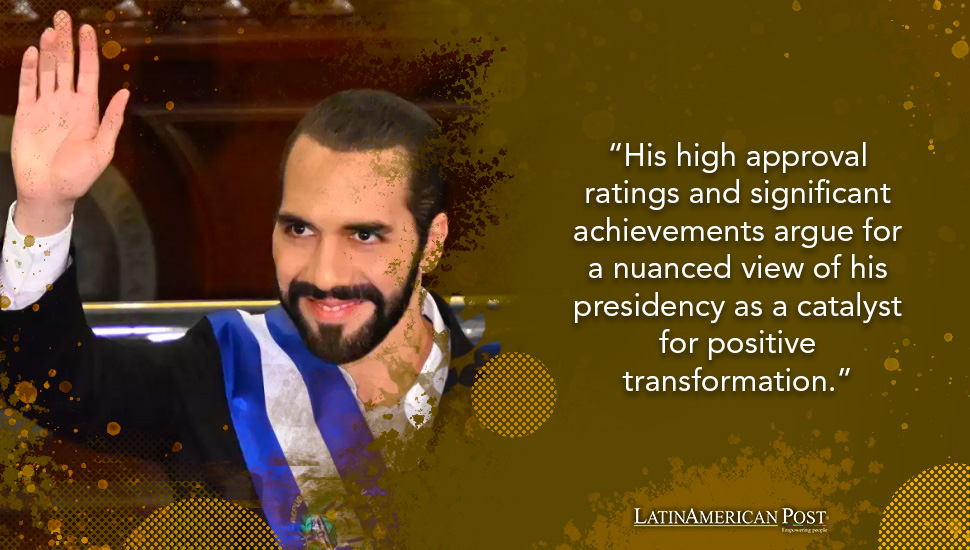Nayib Bukele: Transformative Leader Challenging Old Norms and Delivering Results

Nayib Bukele, El Salvador’s youngest modern president, combines charisma with effective governance. Critics label his tactics as authoritarian, yet his innovative policies—like adopting Bitcoin and tackling gang violence—reflect a bold vision for change. Despite controversies, his high approval ratings and significant achievements argue for a nuanced view of his presidency as a catalyst for positive transformation.
A Vision of Change
In an era where political disillusionment runs rampant, Nayib Bukele’s presence in the presidency of El Salvador offers a compelling narrative of change and audacity. Since taking office, Bukele has emerged as a leader with an eye for the theatrical and a genuine agent of transformation in a country long beleaguered by violence, corruption, and economic stagnation. His critics are quick to paint his governance style with the broad brushstrokes of authoritarianism. Yet, a closer examination reveals a leader deeply committed to breaking the cyclical failings of traditional politics in El Salvador.
Bukele’s early declaration on social media of being the “Coolest president in the world” was not mere bravado but a signal of his intention to lead differently. His unorthodox approach, including the public dismissal of officials tied to nepotism and corruption via Twitter, was a breath of fresh air for many Salvadorans. It was a public cleansing of a system that had for too long served the interests of a few at the expense of the many. This act set the tone for his presidency, marking him as a leader not afraid to wield the digital hammer against the towers of entrenched power.
The criticisms against Bukele, especially his confrontation with the legislature, underscore a broader struggle between transformative leadership and traditional governance. When heavily armed forces entered the parliament, it was a stark illustration of Bukele’scommitment to securing the necessary resources to combat the country’s endemic gang violence. This bold move, while controversial, underscored his message that the old ways of passive politicking would no longer suffice in the face of El Salvador’s urgent challenges. The populace’s subsequent support and election of a pro-Bukele congress speaks volumes about the public’s hunger for decisive action and actual results.
Beyond Labels: A Millennial Leader?
Labeling Bukele as “Latin America’s first millennial dictator” is not only reductive but also dismissive of the complex realities that his administration is navigating. Such characterizations overlook the tangible progress made under his leadership, particularly in public safety and urban renewal. Under Bukele, El Salvador has seen a historic reduction in homicide rates, a testament to the effectiveness of his hardline stance against gangs. While controversial, the adoption of Bitcoin as legal tender represents an innovative attempt to modernize the Salvadoran economy and integrate it into the global digital landscape.
Critics argue that Bukele’s strategies, particularly the mass detentions of suspected gang members, are unsustainable and potentially dangerous. While concerns about civil liberties and judicial overreach are valid, they must be balanced against a nation desperate for safety and stability. Bukele’s policies have yielded a palpable sense of security in communities once plagued by violence, offering a foundation to build a more prosperous future. This achievement cannot be understated and has rightfully contributed to his soaring approval ratings.
The charge of nepotism, often levied against transformative leaders, seems particularly moot in BBukele’scase. His administration’s successes in reducing crime and revitalizing urban centers like San Salvador’s historic district far outweigh the criticisms. Bukele’s governance demonstrates a clear break from the past, moving away from the ideological rigidity of traditional parties to a more pragmatic and results-oriented approach. His expulsion from the FMLN and subsequent victory as an outsider candidate underscore his broad appeal and the public’s appetite for leaders prioritizing action over political orthodoxy.
A Nuanced Perspective
To dismiss Bukele’s achievements and to focus solely on the potential for authoritarianism is to ignore the nuanced landscape of Salvadoran politics. Bukele represents a new type of leadership that is both a product and a reflection of a global generation disillusioned with the status quo. His administration could have been more flawless, but it has been markedly effective in addressing some of El Salvador’s most intractable problems. The international community and BBukele’scritics would do well to recognize the complexity of governing a country at the crossroads of profound social and economic challenges.
The imposition of Bitcoin as legal tender is a case in point. While the move has faced skepticism, it positions El Salvador as a pioneer in the global financial system, attracting significant international attention and investment. This bold economic experiment, emblematic of Bukele’s willingness to embrace risk for progress, could redefine El Salvador’s economic landscape in the future.
Furthermore, Bukele’s efforts to suspend civil liberties in the fight against gangs must be viewed through the lens of a nation under siege. Where previous administrations faltered, Bukele has taken decisive action, significantly disrupting gang operations and restoring a sense of security to Salvadoran streets. While vigilance against potential abuses of power is necessary, it’s equally important to acknowledge the context of Bukele’s actions and their popular support.
Bukele’s Impact on El Salvador’s Future
As El Salvador looks toward the future, Nayib Bukele is a polarizing yet undeniably impactful figure. His presidency challenges us to reconsider the boundaries between authoritarianism and assertive governance in the context of profound national crises. Bukele’s methods may be unconventional, but they reflect a deep-seated desire to usher in an era of renewal and hope for a country that has seen too little of both.
Also read: Bukele’s Bold Reforms are a Beacon of Hope for El Salvador
Nayib Bukele’stenure’s tenure as President of El Salvador represents a pivotal moment in the nation’s history. His administration, marked by bold initiatives and a willingness to confront entrenched issues head-on, has sparked a reevaluation of what leadership looks like in the face of systemic challenges. While the road ahead is fraught with complexities, a vision for a revitalized El Salvador, free from the shadows of violence and corruption, offers a compelling blueprint for transformative governance. As the world watches, it becomes clear that Bukele’s presidency may redefine the contours of political leadership in Latin America and beyond.




